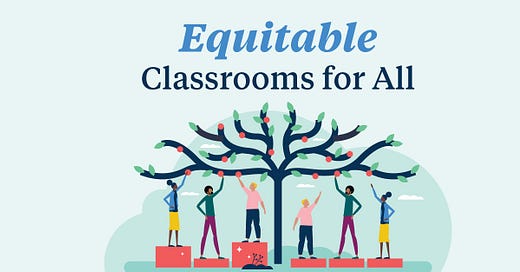What do you do, as a student, if you’re attending a tax-funded university to get an education and your professor turns the classroom into her own personal DEI mission? Let’s say you just wanted to learn about creative writing, but the professor uses the class to force her opinions about social justice on you and the other students. Instead of learning about creative writing, you’re forced to accept the professor’s pet political project.
I’m here to help.
You are paying for this course. It is meant to help you learn about the subject. And instead, this professor has decided to cheat you out of that education. Begin by respectfully asking the professor to define “justice.” You’ll be surprised how quickly the answers turn into nonsense. Let me give you an example.
Student: I notice you’re asking us to learn about your social justice project. Can you define justice?
Professor: Justice is when you fairly distribute resources.
Student: That’s a circular definition—“fair” and “justice” are interchangeable. Can you define justice in a non-circular way? [also true if they use the word “equitable”]
Professor: When everyone has equal resources.
Student: What if people don’t want equal resources?
Professor: Of course people want equal resources.
Student: No, some people want to study creative writing, which generally does not pay well, and others want to study technology and start a company they can one day sell for retirement-level money. Society is made of generations of people making these kinds of choices.
Professor: The government should make those choices have equal outcomes.
And there it is. You’ll find this discussion always circles back to the professor’s belief that suffering is caused by unequal resources, and that these inequalities are the result of structural problems—problems that, conveniently, can all be solved by their version of totalitarian government that overrides all personal choices.
[Notice the image suggests hindering those who are naturally taller with a shorter box, as if DEI proponents read Kurt Vonnegut’s Harrison Bergeron as a “how to guide”]
It’s a childish solution to the problem of evil, full of magical thinking about how reality works. “Timmy got a bigger piece of cookie than me, life is not fair!” But the worst part is this: some of these professors live lives marked by wallowing in self-pity, blaming others for their disappointments in life, consumed by envy and anger at the success of others and the problems in their own families, and in some cases reliant on substances or sexual experimentation to dull the pain. They aim all of this rage at “the system,” or “the United States,” or “the whiteness” to deflect from self-examination.
You’ll notice in conversations that they have no real solutions for life’s deepest problems beyond “take from others to make me happy.” They can’t solve their own life problems, yet they want to be in charge of your life. They’re always waiting for some external change to the government or environment to begin making their life better.
Ultimately, you’ll discover something deeper: they hate God. In their view, God has mismanaged the world, and they are here to set things right. These professors, in their great wisdom, believe they are ready to take over for God—and show Him how it's done.
But no, don’t you dare call them Marxists. And don’t point out that their obsession with controlling society places them much closer to fascism than they’d ever admit.
You deserve an education free from professors misusing the classroom for their ideological crusades. If this persists, know that you can contact the Arizona State Senate. They have rightly determined that taxpayer-funded classrooms cannot be used to indoctrinate students with political ideologies and talking points masquerading as education such as:
Critical theory.
Whiteness.
Systemic racism.
Institutional racism.
Antiracism.
Microaggressions.
Systemic bias.
Implicit bias.
Unconscious bias.
Intersectionality.
Gender identity.
Social justice.
Cultural competence.
Allyship.
Race-based reparations.
Race-based privilege.
Race-based diversity.
Gender-based diversity.
Race-based equity.
Gender-based equity.
Race-based inclusion.
Gender-based inclusion.




